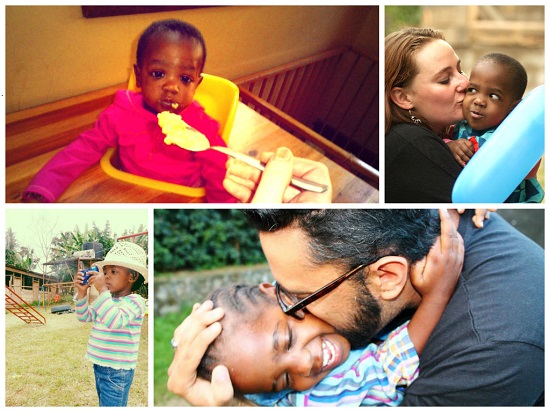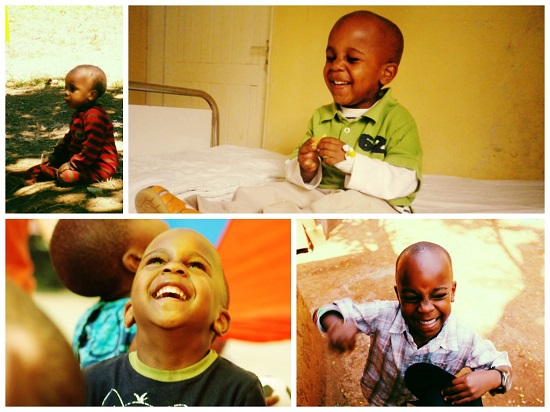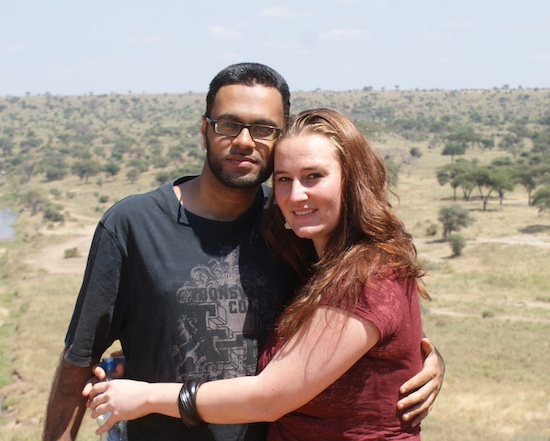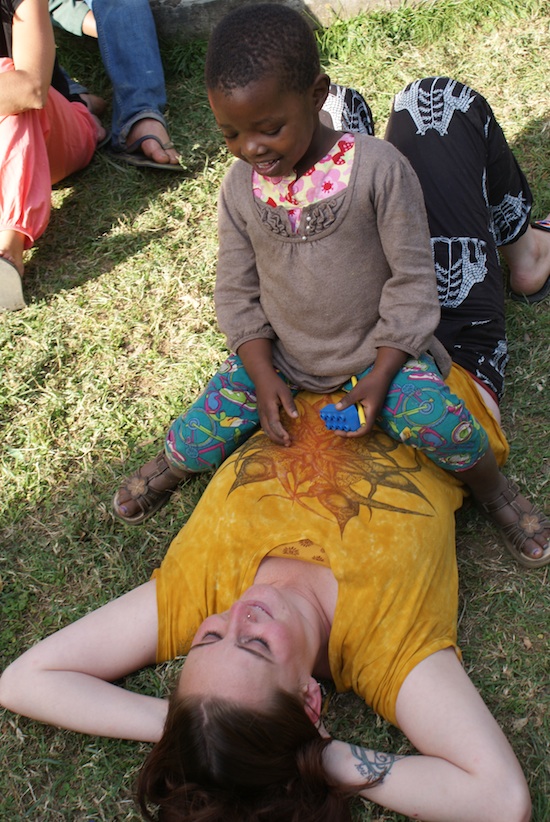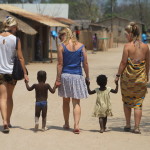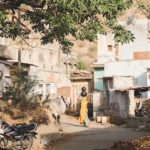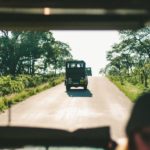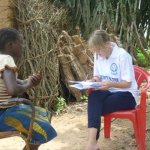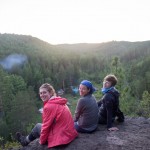Launching an NGO for Tanzanian Orphans: A Conversation with Bekka Ross Russel

Most twenty-somethings I know are exploring the world, in the early stages of building their careers, or in the throes of applying to graduate school. But, Bekka Ross Russel is not your typical twenty-something. In her short life, she has already lived in several countries, launched a nonprofit that seeks to support a local Tanzanian orphanage, and adopted two orphans in Tanzania with her husband, Riz.
Bekka is an especially inspiring young woman because not only has she allowed her passion to lead her out of her comfort zone and into a life filled with meaning. She has done so with a great deal of thought and care—combining education, research, and immersion in forging her life’s path.
I understand that you have spent significant time living abroad—including in Israel, England, and Tanzania. What causes you to immerse yourself in a country for a longer period of time?
I was born in England and come from an international family, British on one side, and Holocaust survivors on the other, and I flew on my first transatlantic flight at something like three months old, so I was always destined to travel! However, I’ve never been one for fly-by trips—I feel like you only get to see the surface of a place, and I’m much more interested in the people and their stories, rather than just sightseeing.
And as an aid worker, it is crucial to understand the community needs before you can think about helping to meet them.
It takes time to learn the language and culture, and to get to know people who can guide you (to this day, after four years of working in Tanzania, I still depend heavily on Tanzanian friends and staff to get the full story in any given situation, since as a foreigner it is much more difficult). The longer you stay, though, the more you understand the rhythms and practices of a different culture, and I love that process. And as an aid worker, it is crucial to understand the community needs before you can think about helping to meet them.
What first drew you to Tanzania, and how did you get involved in the Nkoaranga orphanage?
I graduated university knowing that I wanted to pursue a master’s degree in international development, but without a lot of experience, so I decided to spend a year volunteering first. The majority of the schools I was applying to basically said not even to bother applying straight out of undergrad, to do something cool for a few years and then come back—what a great excuse! My original plan was four months in Africa and four in South America, and I chose Tanzania for the usual reasons—it is safe, has incredible travel opportunities with safaris and Zanzibar, most people speak English, etc.
Funny story, I actually was trying to stay away from working with kids, because I wanted to do something new. Clearly, that didn’t work out so well!
When I arrived, I was working first at a vocational school for orphaned and vulnerable teenage girls. Unfortunately, the organization I was working for ended up being horrifically corrupt, which was very disappointing. I ended up taking my best student and leaving—she is now one of my closest friends and works for us at TST! Anyway, from the beginning I had been working at Nkoaranga Orphanage one day per week, since I love kids and was had no classes to teach on Fridays. Funny story, I actually was trying to stay away from working with kids, because I wanted to do something new. Clearly, that didn’t work out so well!
I started doing some digging at Nkoaranga about transparency and accountability, and found that they were well-run and not corrupt. A lot of this has to do with the layers of oversight—the orphanage is owned by the local hospital, which is owned by the Lutheran church, so there are a lot of eyes on everything! I also got to know the mamas, especially our head mama, Martha Ayo (known as Mama Pendo), and could see how deeply committed they were to these children. And of course, I met Zawadi and Saimoni, our two incredible kids, who were just a year and two and a half years old at the time, and both had quite serious medical issues.
The resources were there, the motivation and energy were there, but the structure was missing.
It became clear that Nkoaranga had the important things in spades—love, affection, and tenderness—but they needed much more financial support and organization to truly thrive. Volunteers schedules were haphazard at best and tended to cluster around the least useful hours, and many people who would have been willing to donate to help the children were hesitant, since it would need to pass through the church and hospital first. The resources were there, the motivation and energy were there, but the structure was missing. I realized after spending months talking to Mama Pendo that they knew what they needed—it was just a matter of access. If we could bring together the efforts of everyone who cared about these kids worldwide, we could make a big difference!
It’s amazing that you started the nonprofit, The Small Things. What sort of challenges did you face in starting an NGO in Tanzania? What was the process like?
The orphanage is actually locally owned and run, which we love and think is really important, since as a rule the local community knows their needs much better than a group of foreigners! But yes, we started The Small Things to support and partner with the orphanage, and now we have expanded to the point that we recruit and train volunteers, have a strong outreach program, and are now beginning construction on a Children’s Village for when the children age out of the orphanage at age five.
Zawadi claimed me first, she couldn’t even crawl but she would wiggle her way across the floor and literally push any other child off my lap!
Up until about 10 years ago, the kids were being sent back at age five to their village regardless of whether they had relatives willing and able to care for them, which led to between a third and half of them being neglected, abused, or dying within a year. Mama Pendo’s dream has always been to create real homes that the kids can come back to throughout their lives, and we’re so thrilled to be partnering with Happy Family and the Visram family to make that happen in the Happy Family Children’s Village in memory of Amir Visram!
I understand that you are in the process of adopting two children who were previously part of the Nkoaranga orphanage. What is the process like of adopting a child in Tanzania?
It is an adventure, that’s for sure! Adoption in this country is very difficult. The law states that non-Tanzanians must be over the age of 25, be at least 21 years older than the child they plan to adopt, and get permission of any living relatives for adoption. Our own daughter and son have no living parents—our daughter has only an uncle and grandmother, and our son has great grandparents and a great aunt, all of whom are supportive of the adoption and with whom we keep in regular contact. You also need to foster the child for three months before formally filing for adoption. Those rules are enforced consistently.
It’s very frustrating and sad, because there are many children without relatives willing and able to care for them, who would thrive in foreign families.
The Tanzanian law also state that you must be married and you must have lived in Tanzania for at least three years; those are both frequently waived if it’s considered “in the best interest of the child.” However, they aren’t guaranteed to be waived, so although most adoptions can take place in about a year to 18 months on the ground, it’s irresponsible to start without the ability to stay for longer if necessary. It’s very frustrating and sad, because there are many children without relatives willing and able to care for them, who would thrive in foreign families. That said, I believe strongly in family reunification whenever it is possible, so any liberalization of the adoption laws would need to be carefully structured to avoid removal of children from families based purely on poverty.
When I met my kids, our daughter Zawadi (meaning gift) had bad worms and was quite malnourished and undersized because of it, and our son Saimoni was almost three and still not walking due to bad rickets from early/prenatal malnutrition, as well as being quite withdrawn because he was mostly ignored by kids his age. I spent a lot of time with them, getting them healthy, and as Zawadi got her energy back and Saimoni started to come out of his shell, these huge, incredible personalities started to emerge from these tiny people. Zawadi claimed me first, she couldn’t even crawl but she would wiggle her way across the floor and literally push any other child off my lap! I agreed with my family that if I finished graduate school and still wanted to adopt them, they would support us. I am so lucky to have had their support from day one.
When you met your husband in England, did you both share the dream of moving to Tanzania to take part in founding a nonprofit and adopting children? What was the process like of deciding this was what you both wanted?
Oh, my poor husband…I sprung the kids on Riz on our second date, which he took remarkably well. “So hey, I kind of have two children who don’t live in the same country as me but I’m moving to the other side of the world in 18 months to adopt them. Wanna go out again?” He met the kids in the summer of 2012, when we were talking about the fact that if we wanted to stay together, we would get married and adopt as a couple—not a small commitment, obviously. But he fell hopelessly in love with them, as I hoped he would, and the rest is history. We got married on March 28, 2013, and moved to Tanzania on April 3. So far so good!
To be fair, it helps that Riz was born in Kenya and his family lived in East Africa for several generations, so the idea of moving sounded less insane to him than it might have been to another guy. Speaking fluent Swahili also helped me get in with his family, who were not particularly pleased about their son marrying a white Jew who was dragging him to the other side of the world!
Have you faced any challenges as a woman traveling in Tanzania, or in other countries in Africa? What preparations should women take before traveling to Tanzania?
I have faced a few challenges as a female traveler, but nothing too onerous. As always, one has to be careful about going out alone or after dark, things like that. However, we live and have always focused on a small village, and Tanzanian villages are very communal places. Everyone knows your name and looks out for you, which makes a huge difference. It is a little different in the city, where most people are just passing through.
Being dressed appropriately is also a marker of a traveler being respectful and deferent to the local culture, which tends to get you a much warmer welcome.
The main things female travelers need to know when traveling in Tanzania is about modest dress, as showing too much skin by men or women is considered very disrespectful—no cleavage, bare shoulders, or shorts above the knee. Being dressed appropriately is also a marker of a traveler being respectful and deferent to the local culture, which tends to get you a much warmer welcome.
Have you faced any challenges as a foreigner who is running an orphanage in Tanzania? If so, how have you worked to overcome those challenges?
Partner, partner, partner! Of course, there are always challenges, but the most important thing we have found is to find local partners we trust, and then listen to their needs and ideas. Trying to get paperwork through in this country as a foreigner is almost impossible; hire local staff who can make it happen. Our biggest focus is just being responsive to and respectful of the community’s needs, and the rest tends to fall into place from there. There are also a lot of infrastructural challenges in a place like this, from internet being incredible expensive and frequently unreliable, to power outages almost daily, to water shortages, to difficult roads…
I sprung the kids on Riz on our second date, which he took remarkably well. “So hey, I kind of have two children who don’t live in the same country as me but I’m moving to the other side of the world in 18 months to adopt them. Wanna go out again?”
Of course, as a nonprofit in general, the biggest problem is always money, money, money! Luckily, we have an incredible base of supporters, who through their mostly small contributions have helped to create huge change. Every bit makes a difference!
Do you plan to stay in Tanzania for the foreseeable future? What are some of your future life goals?
My husband and I are hoping to stay for about another two years, until the children’s village is up and running smoothly and our adoptions are 100% complete. Unfortunately, education is the biggest issue—international schools are the only options that are high enough quality that our children could transition from them to the American system, and international schools are prohibitively expensive, especially on a startup nonprofit salary! We also really want to be closer to family, since these are my parents’ first grandchildren. However, we’ll definitely be back and forth frequently.
Our long-term vision for the organization includes parenting classes, vocational training programs, business development, and much more.
In terms of my own goals, I hope to be doing this work for the rest of my life! Of course, living on the ground in the US will require a lot of changes. I will focus more on fundraising and overall direction, and have to find trusted staff to run everything on the ground. Our long-term vision for the organization includes parenting classes, vocational training programs, business development, and much more. We aim to get up to about 100 children in our current site, in 10 family style houses. At that point, we feel that we will likely have fully met this particular community’s needs and would be able to do more good in another area.
I would love for us to serve as an umbrella organization or incubator for similar projects across Tanzania and greater East Africa, eventually, since one of the big difficulties in working here is the number of fractured organizations who often resist working together.
Many young women are looking for meaningful, on-the-ground volunteer opportunities. How can they get involved in The Small Things? What sort of impact can they expect to have?
Volunteers are so important to what we do, and to our entire ethos of bringing small efforts together from all over the world to make big change for these children. There are tons of needs, and almost anyone can have an impact on the ground, whether as a standard volunteer working with children, or helping with organizational development, or fundraising, or… the options are practically endless.
Most volunteers work directly with the children in the orphanage and our pilot house, which is the trial run for the children’s village houses. They play with them, dress them, change them, feed them, wash them, and generally help with all of the day-to-day tasks so that the mamas can focus more on the children. While we love for volunteers to bond with the kids, their main goal is to allow the children to develop secure bonds with their primary caregivers, which is impossible if they are constantly running around like chickens with their heads cut off!
There are tons of needs, and almost anyone can have an impact on the ground, whether as a standard volunteer working with children, or helping with organizational development, or fundraising, or… the options are practically endless.
Huffington Post also recently published an article of mine talking about the impact of volunteers. It really sums up everything I want to say, so please go check it out if you are interested. Then get in touch with us through [email protected]. We also invite people who cannot travel to Tanzania to join our committees or help fundraise for the organization, check out the website or get in touch for more details. We can’t wait to hear from you!

